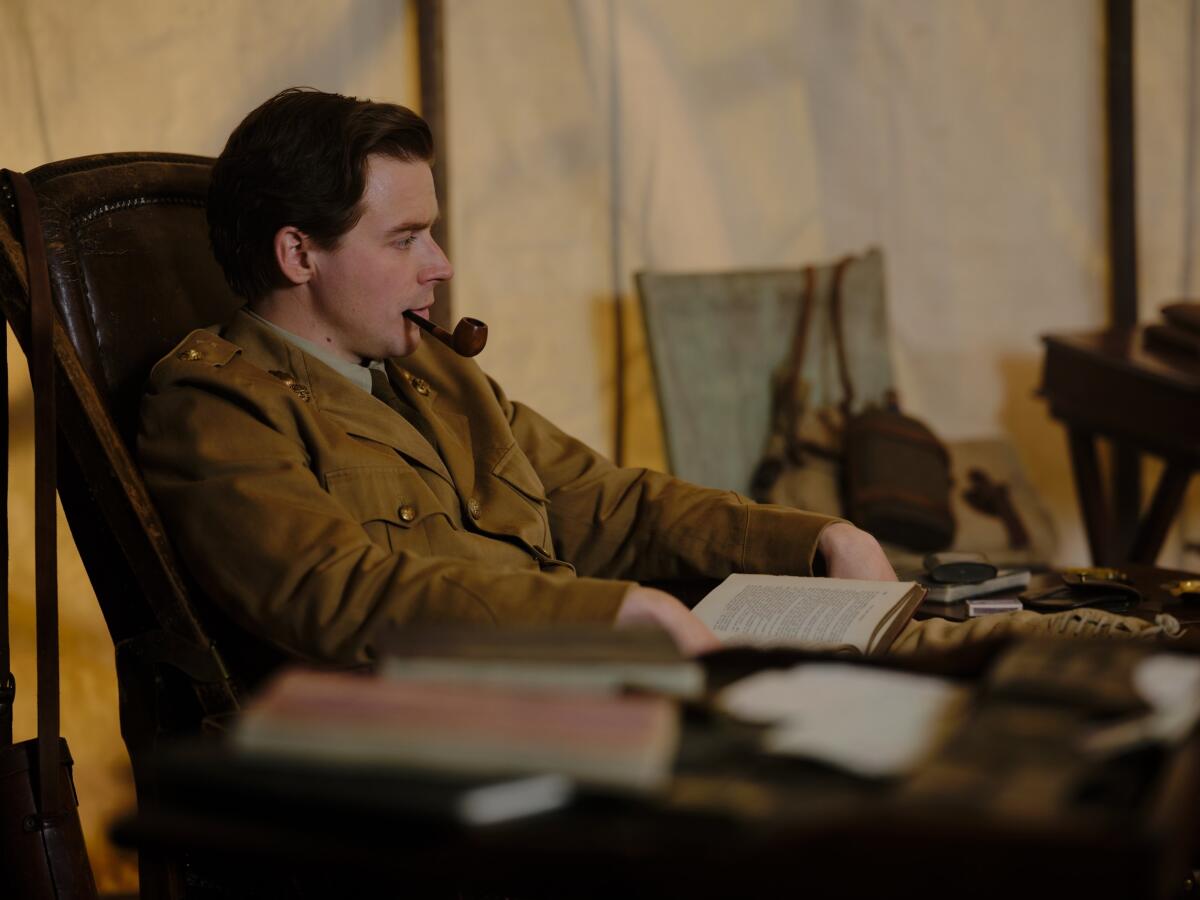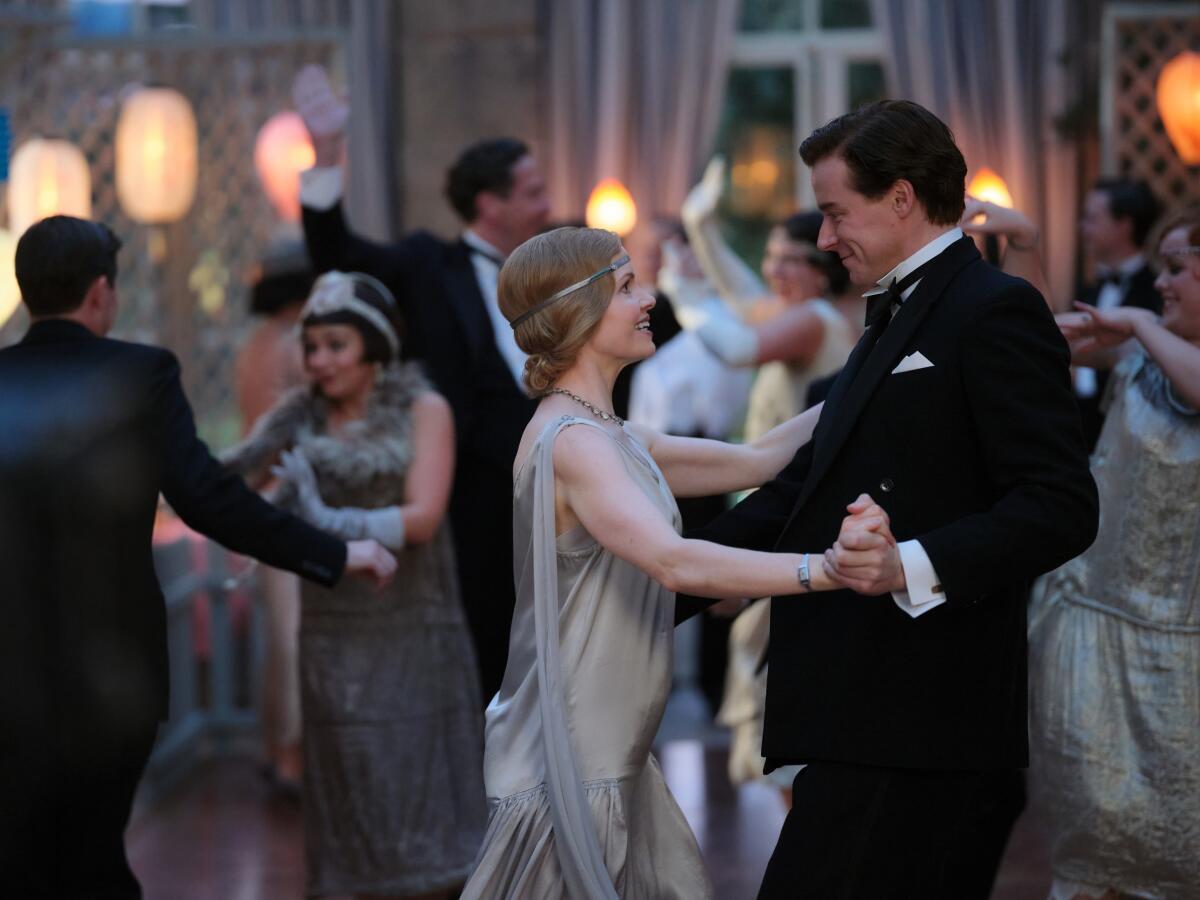‘Benediction’ is a shattering biopic of the English war poet Siegfried Sassoon

- Share via
“Benediction,” Terence Davies’ achingly beautiful portrait of the English war poet and soldier Siegfried Sassoon, is a movie of acute sadness and intense pleasure. The pleasure and the sadness are inextricable, which seems fitting, given how closely aesthetic bliss and moral despair were entwined in Sassoon’s own art. In furious, somber and, yes, frequently thrilling language, he laid bare the horrors of World War I and excoriated the moral blindness of its architects and supporters. His poem “Suicide in the Trenches,” first published in 1918, ends with this stinging rebuke:
You smug-faced crowds with kindling eye
Who cheer when soldier lads march by,
Sneak home and pray you’ll never know
The hell where youth and laughter go.
A decorated veteran of the Western Front before he turned conscientious objector, Sassoon knew of what he spoke. Sprinkling passages of his poetry over somber reams of old war footage, “Benediction” is, among other things, a mournful tribute to the wounded and fallen, suffused with a particular compassion for those survivors who, like Sassoon, never shook off the trauma of what they experienced. Few filmmakers have Davies’ gift for evoking states of loneliness, and here he suggests the terrible isolation visited upon those who endured the horrors of armed conflict.
For your safety
The Times is committed to reviewing theatrical film releases during the COVID-19 pandemic. Because moviegoing carries risks during this time, we remind readers to follow health and safety guidelines as outlined by the CDC and local health officials.
But “Benediction,” venturing well beyond the war years that fired Sassoon’s own poetic imagination, is about more than one kind of isolation. As a portrait of a gay man living in early 20th century Britain, it could scarcely be otherwise. And in the Scottish actor Jack Lowden (“Dunkirk,” “Fighting With My Family”), Sassoon has found a most eloquent and empathetic interpreter. Through Lowden’s thoughtful, tender, quietly charismatic and finally anguished performance, we come to grasp not only Sassoon’s struggles with his sexuality, his art and his destiny, but also the unpredictable evolution of those struggles over time. Drifting between past and future, history and memory, “Benediction” captures the strange, specific alchemy by which contradictory fragments of identity assemble themselves into a soul.
It goes without saying that Davies’ insistence on this kind of emotional interiority — and his accompanying disinterest in expository montages and wildly gestural, prosthetic-laden performances — run counter to the strategies and priorities of the average mainstream biopic. (That much was already clear from “A Quiet Passion,” his splendid 2017 portrait of another great poet, Emily Dickinson.) And his formal approach — in particular the fluid, languid rhythms of Alex Mackie’s editing; the stately, almost symmetrical widescreen images composed by the cinematographer Nicola Daley; and a soundtrack that samples Stravinsky, the Gershwins and other music-hall staples of the era — would be hard to mistake for that of any other filmmaker.
But the singularity of “Benediction” arises from more than just a spirited rejection of Hollywood convention. What has united most of Davies’ dramas (excluding his masterful early memoirs, “Distant Voices, Still Lives” and “The Long Day Closes”) is a deep if understated identification with his protagonists, an ability to perceive — in the tragic destinies of women like Lily Bart in “The House of Mirth” and Hester Collyer in “The Deep Blue Sea” — a shared alienation from the prevailing codes and mores of one’s era. To call “Benediction” a deeply personal film might thus seem unremarkable, since Davies seldom deals in the impersonal. But even by his standards, the story of a fellow gay English artist, even one locked away in an earlier era, touches resonant insights and unusual depths of feeling.

And that feeling, more often than not, is one of bitter failure and futility. We see the young Siegfried’s forceful determination when he denounces “a war of aggression and conquest” that has needlessly claimed the lives of millions, including his younger brother, Hamo (Thom Ashley). But his defiant protest has little effect; rather than being court-martialed, Siegfried is declared mentally ill and sent to a Scottish military hospital. There, he meets a sympathetic therapist, Dr. Rivers (Ben Daniels), and a fellow convalescing war poet, the great Wilfred Owen (a sweet Matthew Tennyson), the object of an unconsummated first love that dares not even whisper its name. But despite the emotional and artistic bond that forms between the two men, Owen returns to battle and is killed in action — a tragedy that, for Siegfried, sets the pattern for a lifetime’s worth of thwarted longings.
Those longings are occasionally sated by the many handsome, well-spoken young men who move within Siegfried’s artistic circle. (They also inspire some commiseration with older mentors like the journalist Robbie Ross, a friend of Oscar Wilde’s played here by the excellent Simon Russell Beale.) One of the achievements of “Benediction,” as it drifts from Siegfried’s quiet family home in Kent (Geraldine James plays his warmly supportive mother) to the bustling theaters, restaurants and house parties of London, is to illuminate the pockets of privilege enjoyed by wealthy, culturally influential gay men in an otherwise repressive and inhospitable era. But the pleasures of such privilege — the companionship of friends, the expression of long-forbidden desires — also come with a corrosive aftertaste of confusion, betrayal and heartache.
Much of that heartache is dispensed by the popular musician Ivor Novello (a smoldering, viperous Jeremy Irvine), who sings his witty ditties at the piano and dispenses little nuggets of verbal poison everywhere else. Ivor treats the besotted “Siggy” as callously as he does his many other lovers; they include the theater actor and director Glen Byam Shaw (Tom Blyth), in whom Siegfried briefly discovers a kindred spirit, similarly well acquainted with what Shaw calls “the inconveniences of this shadow-life we lead.” But our hero’s great love from this period is Stephen Tennant (Calam Lynch), a narcissistic socialite who winds up leaving him most heartbroken of all.

Davies’ gift for caustic witticisms is at its full strength in these scenes, in which Siegfried, for all his own lingual flair, is often overmatched by his paramours for sheer drawing-room-comedy vitriol. In time, exhausted and devastated, he will seek comfort in Catholicism and also embrace the stability and social respectability of marriage, to the poet and artist Hester Gatty (a fine Kate Phillips). This compromise is shown to exact a brutal toll in somber bookending scenes set near the end of Sassoon’s life. (An acerbic Peter Capaldi plays the older, disillusioned Siegfried; Gemma Jones is quietly touching as the long-suffering Hester, while Richard Goulding plays their grown son, George.)
The sense of waste and futility that haunts these later scenes is crushing, not least because it seems to hint at regrets and resentments that lie beyond the reach of the movie’s subject. It’s hard to watch the elderly Siegfried, seething with contempt and self-defeat and railing against rock ’n’ roll music, and not be reminded of Davies’ own well-documented ambivalence about his homosexuality, his Catholicism and the ever-shifting tides of popular culture.
But if “Benediction” is itself a declaration of outsiderhood, one that stands poignantly apart from cinema’s more affirming narratives of queer awakening, Davies rarely allows this subtext to overpower the specificities of his subject. Nor does he lose sight of the larger tragedy that so irrevocably shaped Sassoon’s life and art. The final moments, set to a staggering recitation of Owen’s poem “Disabled,” are particularly devastating in the way that they bring home Sassoon’s haunting memories of love and war — and his firsthand knowledge of the destructive power of both.
‘Benediction’
Rated: PG-13, for disturbing war images, some sexual material and thematic elements
Running time: 2 hours, 17 minutes
Playing: Starts June 3 in limited release
More to Read
Only good movies
Get the Indie Focus newsletter, Mark Olsen's weekly guide to the world of cinema.
You may occasionally receive promotional content from the Los Angeles Times.











